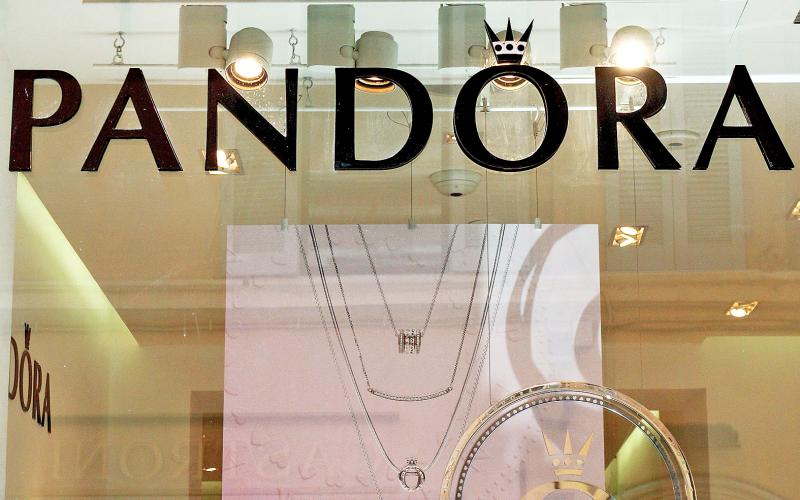Pandora A/S, which makes more pieces of jewelry than any other company in the world, is to stop using mined diamonds as part of a broader strategy to drop raw materials associated with unethical production methods.
Despite decades of reform, the global jewelry market remains tainted by reports of human rights abuses at mines and factories.
To address such concerns, Tiffany & Co last year started providing customers with details of newly sourced, individually registered diamonds that trace a stone’s path back to the mine.

Photo: Reuters
Yesterday, Copenhagen-based Pandora said that it would only use diamonds manufactured in laboratories.
The company is set to release its first collection using lab-made stones in the UK, and would expand to other markets next year.
The decision to shun mined diamonds comes less than a year after Pandora pledged to stop relying on newly mined gold and silver.
By 2025, its entire production would only use recycled precious metals as part of a plan to ensure that its operations are carbon neutral within four years.
Pandora’s lab-made diamonds are grown from carbon with more than 60 percent renewable energy on average, a ratio that is set to rise to 100 percent next year.
The company is taking a stand on its raw materials as investors increasingly focus on sustainability.
Nordea’s asset management unit recently said that it plans only to hold securities that live up to environmental, social and governance standards across all its portfolios.
To be sure, Pandora uses relatively few diamonds in its production. The firm, which has branded itself a maker of affordable trinkets, last year used mined diamonds in about 50,000 pieces of jewelry out of about 85 million pieces.
Lab-made stones cost about one-third the price of mined ones and the switch would make diamond jewelry accessible to more consumers, it said.

Nvidia Corp CEO Jensen Huang (黃仁勳) today announced that his company has selected "Beitou Shilin" in Taipei for its new Taiwan office, called Nvidia Constellation, putting an end to months of speculation. Industry sources have said that the tech giant has been eyeing the Beitou Shilin Science Park as the site of its new overseas headquarters, and speculated that the new headquarters would be built on two plots of land designated as "T17" and "T18," which span 3.89 hectares in the park. "I think it's time for us to reveal one of the largest products we've ever built," Huang said near the

China yesterday announced anti-dumping duties as high as 74.9 percent on imports of polyoxymethylene (POM) copolymers, a type of engineering plastic, from Taiwan, the US, the EU and Japan. The Chinese Ministry of Commerce’s findings conclude a probe launched in May last year, shortly after the US sharply increased tariffs on Chinese electric vehicles, computer chips and other imports. POM copolymers can partially replace metals such as copper and zinc, and have various applications, including in auto parts, electronics and medical equipment, the Chinese ministry has said. In January, it said initial investigations had determined that dumping was taking place, and implemented preliminary

Intel Corp yesterday reinforced its determination to strengthen its partnerships with Taiwan’s ecosystem partners including original-electronic-manufacturing (OEM) companies such as Hon Hai Precision Industry Co (鴻海精密) and chipmaker United Microelectronics Corp (UMC, 聯電). “Tonight marks a new beginning. We renew our new partnership with Taiwan ecosystem,” Intel new chief executive officer Tan Lip-bu (陳立武) said at a dinner with representatives from the company’s local partners, celebrating the 40th anniversary of the US chip giant’s presence in Taiwan. Tan took the reins at Intel six weeks ago aiming to reform the chipmaker and revive its past glory. This is the first time Tan

CUSTOMERS’ BURDEN: TSMC already has operations in the US and is a foundry, so any tariff increase would mostly affect US customers, not the company, the minister said Taiwanese manufacturers are “not afraid” of US tariffs, but are concerned about being affected more heavily than regional economic competitors Japan and South Korea, Minister of Economic Affairs J.W. Kuo (郭智輝) said. “Taiwan has many advantages that other countries do not have, the most notable of which is its semiconductor ecosystem,” Kuo said. The US “must rely on Taiwan” to boost its microchip manufacturing capacities, Kuo said in an interview ahead of his one-year anniversary in office tomorrow. Taiwan has submitted a position paper under Section 232 of the US Trade Expansion Act to explain the “complementary relationship” between Taiwan and the US